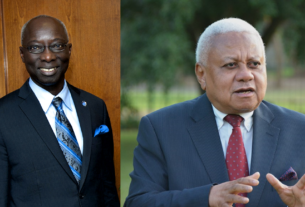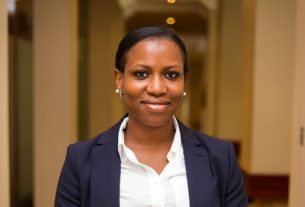Kenza Ait Si Abbou was born in Morocco, and from a young age, it is reported, she was solving math problems faster than her mother was creating new ones. Today, she is responsible for robotics and artificial intelligence at Deutsche Telekom, the largest German and European telecommunications company. Her first book “Keine Panik, ist nur Technik” (Don’t panic, it’s only technology) was published in August 2020. In a recent interview with the German version of the herCAREER platform, she talks about her fascination with artificial intelligence, the possibilities it offers for combating discrimination, and the exciting avenues that are opening up for women and girls in the world of technology.
herCAREER is the leading platform on career planning for women and supports women in their professional development. On Friday, September 17, 2021, from 12:45 to 1:25 p.m., visitors to herCAREER in Munich will be able to hear Kenza Ait Si Abbou live at the Authors MeetUp. Below is the interview with herCAREER.

Kenza Ait Si Abbou is passionate about artificial intelligence and wants to take away people’s fear of intelligent technologies. For her, technological progress and human skills and emotions go hand in hand. At herCAREER 2021, she will present her new book “Keine Panik, ist nur Technik” (Don’t panic, it’s only technology), in which she shows readers the way to the world of artificial intelligence and digitalization. Growing up in Morocco, Kenza Ait Si Abbou discovered her interest in mathematics and physics early on. Graduating with a degree in Electrical Engineering and Telecommunications from the University of Valencia, she worked in Barcelona, finished her master’s degree at the University of Applied Sciences in Berlin and landed at Deutsche Telekom in 2011 as a project manager at T-Systems. Since May 2018, she has been responsible for robotics and artificial intelligence and has been leading an internal women’s network there since 2012.

herCAREER: With the book “Don’t panic, it’s just technology” you want to dispel people’s fear of artificial intelligence. Why is it so widespread?
Kenza Ait Si Abbou: We all know the phenomenon of fear of the unknown. It was the case with the refugee crisis and it is also the case with artificial intelligence. A.I. is above all a technological term that is often explained by many technical terms. Someone who is not involved in technology might say: this has nothing to do with me. But that’s not true. We use these technologies every day and often without knowing it. In the media, we use images of AI that look bleak. And Hollywood also plays with people’s fears: Movies like “Terminator” or “Her” assume that machines acquire consciousness and turn against humans. These films give robots human characteristics such as a conscience, rebellion or emotions. They start from the human being. In reality, however, the technology does not allow for these complex human processes. In fact, we don’t even know yet how human consciousness arises.

herCAREER: In your book, you describe how we are surrounded by algorithms in our daily lives – whether it’s the Apple Watch or the flight portal that adapts its prices to how we search. What is the purpose of your book?
Kenza Ait Si Abbou: It’s important to me that people consciously process these devices and technologies. If I don’t know what’s behind it, I’m at its mercy. But if I know that I am constantly revealing a lot of data about myself, I will manage my device use more consciously and thoughtfully. The goal of my book is to make people aware that they are not victims of technology companies, but that they can also decide for themselves what and how they use. For example, I don’t use PDAs. In my workshops, I often observe an “aha” experience in people: these methods are not magic, but consist of mathematics and certain rules. This is what I want to show in the book.
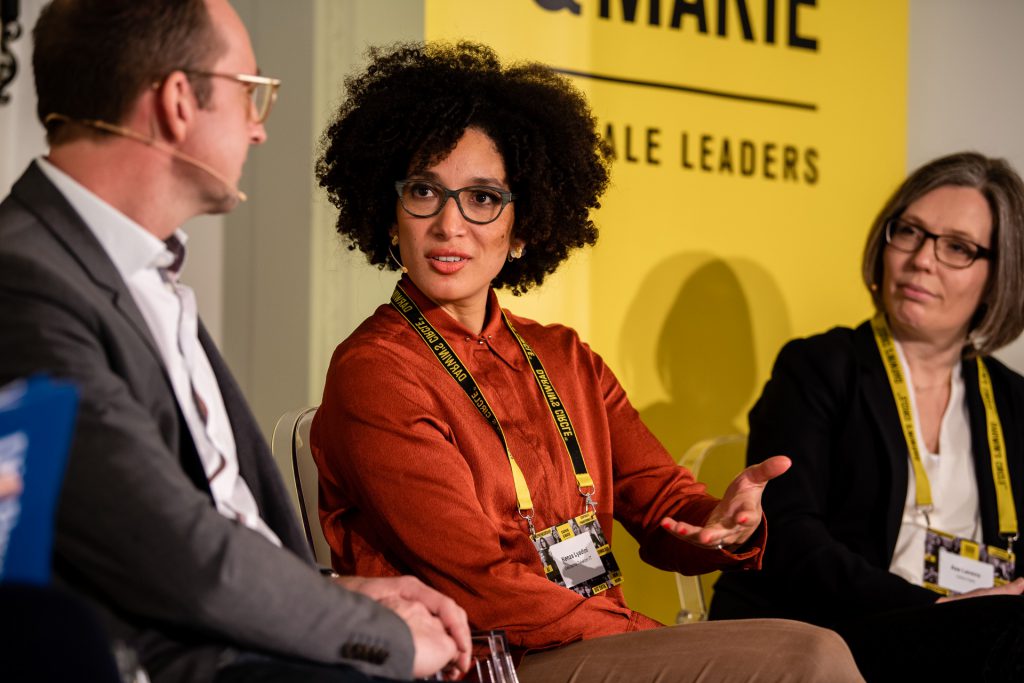
herCAREER: Who or what influenced your interest in technology – cliché question: your two brothers?
Kenza Ait Si Abbou: No, quite the opposite: my brothers had nothing to do with technology. Nothing in particular shaped me, there was just an intrinsic motivation at the beginning. I just liked mathematics and physics and was already interested in them as a child. I went on to get a degree in telecommunications engineering. At that time, engineers were in high demand, and my decision was quite pragmatic. Studies show that by the age of six, children – boys and girls alike – have an equal intrinsic interest in math and technology and want to learn new things. It is only through societal pressures and clichéd role models that gender differences emerge. Of course, there are individual differences, but many children are fundamentally open to this idea and the interest in it escapes them.
herCAREER: It’s often said that we need to choose other approaches for girls and women to make technology acceptable to them and get them excited about it – for example, through moving stories and role models. How much of a role do you think this plays?
Kenza Ait Si Abbou: Access is an important aspect. Because: parents need to bring kids to robotics class – most parents of boys do, but parents of girls do it much less often. That’s where it starts. If you can reach girls, they are just as interested as boys. Interestingly, their goals are different. The founder of Robo Wunderkind told me that the use cases for which kids build their robots sometimes differ by gender. In one workshop, the girls built a robot to paint animals undergoing surgery at the veterinary hospital. So kids are just as interested in building robots, but for different purposes – which is not a bad thing. From the age of twelve, however, the situation becomes critical: during puberty, the role of women (and men) slowly becomes established and interests change.
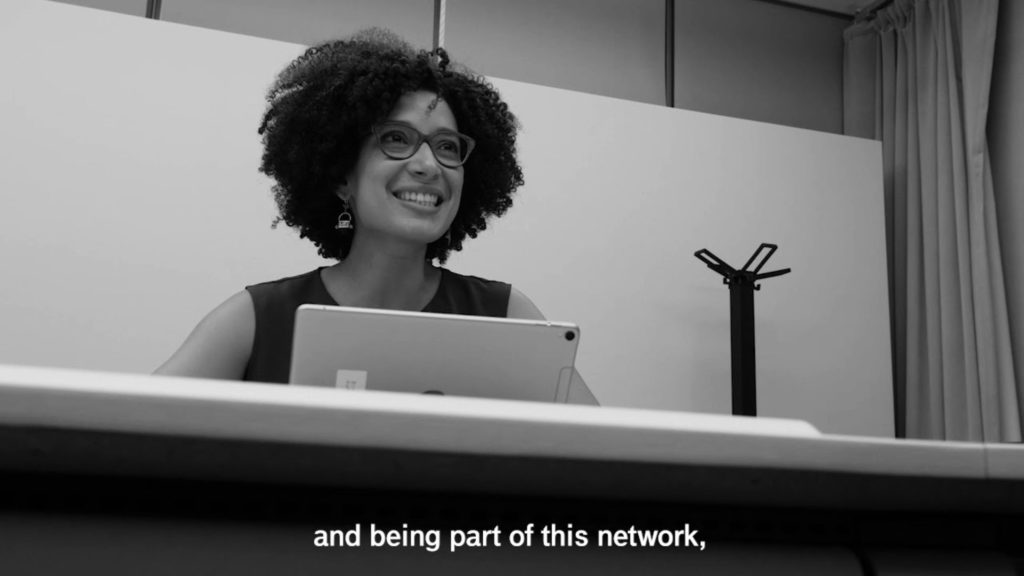
herCAREER: You also hosted an AI hackathon for women, where the winning team used algorithms to check for diversity in job listings. Are women using technology to solve problems that men would not?
Kenza Ait Si Abbou: Yes, of course. Mostly, they solve other problems. The diversity of perspectives makes a difference. If we want women to be interested in technology, we need to combine these courses or trainings with applications that attract them more. This is already happening in university courses. Professors tell me that the “computer science” curriculum is very male, but that many more women enroll in “environmental computing” or “social computing.” You see: I’m studying computer science to do something for the environment. So the purpose for which they use the technology is much more important to women than the technology itself. It was the same for me: during my engineering and electrical engineering studies, I saw in a course on neural networks how A.I. technologies and programming can be used to diagnose breast cancer. My vision and motivation changed as a result.
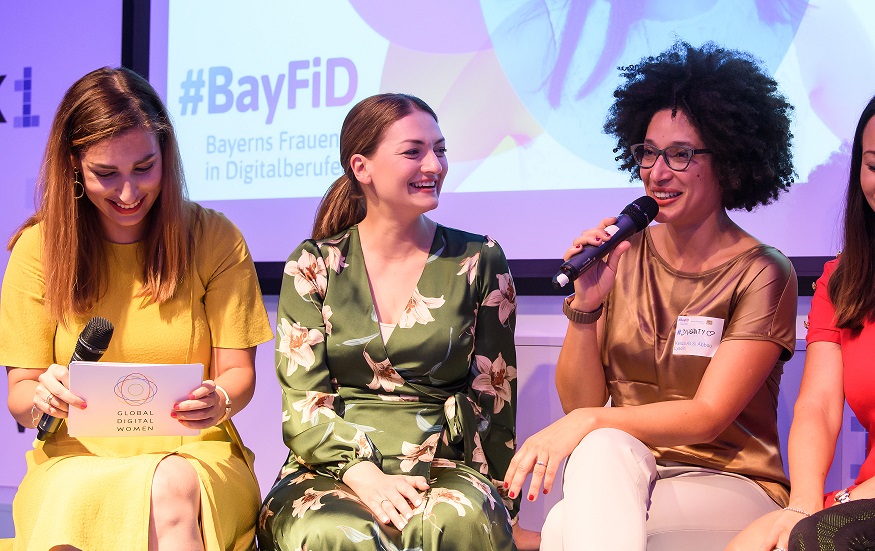
herCAREER: You also learned to code during your studies. What interested you?
Kenza Ait Si Abbou: Coding, learning a programming language, is like learning a foreign language. You think about a logic to solve the problem, structure it in flowcharts, for example, and translate it into codes. You have to give a logical sequence of instructions. I found this algorithmic logic and the programming of industrial robots totally exciting – if you have learned the syntax, programming is not witchcraft.
herCAREER: Where can we start to improve digital skills and basic understanding of technology in society?
Kenza Ait Si Abbou: Awareness and education are the most important things. Adult education is left to companies or individuals. In my opinion, this needs to change for the future – we need to retrain, reskill, upgrade the skills of masses of people, little by little. This is not as possible in small companies as it is in large companies. So digital qualification should be done in a more structural way for as many people as possible. And we need to start early, already in schools.

herCAREER: Discriminatory technologies and algorithms are created by people. How can we solve this problem?
Kenza Ait Si Abbou: We need to review the whole process. Did we choose the right data? Are they representative enough? Is the logic we developed to solve the problem neutral? Or are there biases? Have we tested the software enough? Is the development team sufficiently aware of cognitive biases? Do they know how to recognize and eliminate bias? Is the team diverse enough? So there are different steps to start with. In addition, self-learning AI systems are always learning. Even if a system has been made non-discriminatory: as soon as new candidates have been recruited – who are always screened by humans – the machine learns which people are qualified for the position based on that screening. And that’s where the bias comes in again – so you have to constantly work on it and check that the AI is robust against bias. This is not easy. But it’s certainly easier than getting bias out of people’s heads.
herCAREER: Do you have a final message for girls and young women?
Kenza Ait Si Abbou: You just have to have the courage. Math, technology, computer science are feminine. In the past, men were researchers in the humanities and women tended to be physicists and chemists. In the early computer age, secretaries programmed machines – as shown in the movie “Hidden Figures.” When they realized that these jobs could be interesting and well-paying, they kicked the women out. So the fact that there are fewer women in tech is, in my opinion, due to patriarchal power structures, not their lack of skills.
Biography by Africanshapers
Since May 2018, Kenza Ait Si Abbou Lyadini is Senior Manager for Robotics and Artificial Intelligence in the IT department of Deutsche Telekom, the largest German and European telecommunications company. Kenza Ait Si Abbou Lyadini and her team develop AI solutions for the entire Deutsche Telekom Group, including robotic process automation solutions. She is also responsible for helping customers identify automation and AI use cases and developing the best solution to cover their needs. “I’m building Artificial Intelligence and I like being around people. Does this sound like a contradiction? Not at all! For me, this is what digitalization is all about: a good balance between technical progress and curious and courageous people with emotions. Being a powerful woman in the field of technology, I consider it my duty to make our future more livable, and that should be FOR the people who live it,” she explains on her website.
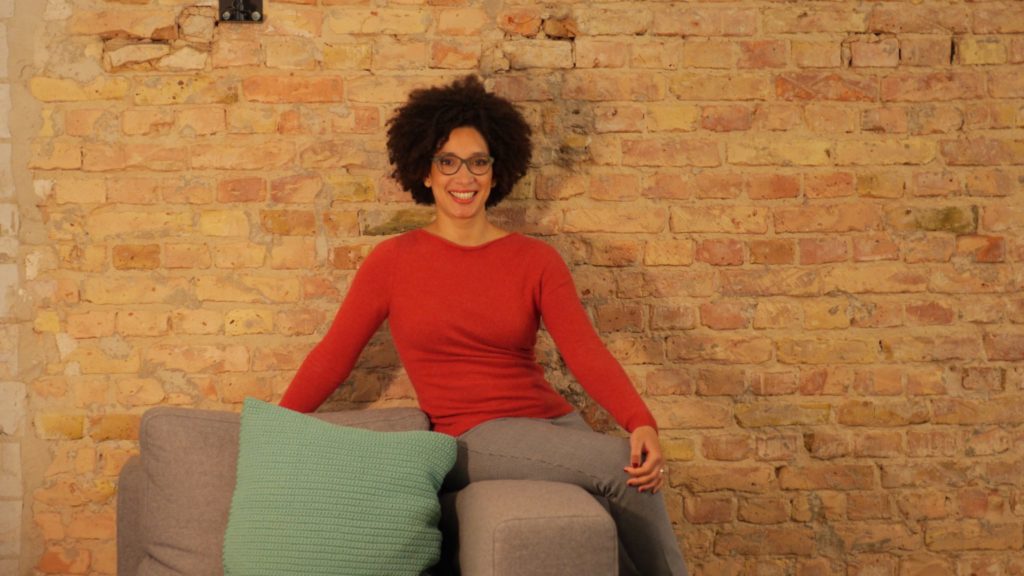
Kenza Ait Si Abbou Laydini describes herself as a citizen of the world, who has lived on three continents and finds the greatest joy in learning new languages and cultures. Born in Morocco, she studied telecommunications engineering in Spain, project management in Germany and Chinese in China. As a child, Kenza Ait Si Abbou Laydini would ask her mother to write down simple mathematical equations for her to solve. “Years later, paper and pencil were replaced by a computer, but my passion for numbers only grew.
After spending three years in hardware development in Spain and a stopover in Shanghai during the 2010 World Expo, Kenza Ait Abbou Laydini joined T-Systems in Berlin, a subsidiary of Deutsche Telekom, as an IT project manager. She worked for 7 years at T-Systems, holding various positions until April 2018, before being appointed to her current position as “Senior Manager for Robotics and Artificial Intelligence” at Deutsche Telekom Group. Among other things, she designed Deutsche Telekom’s new network architecture.
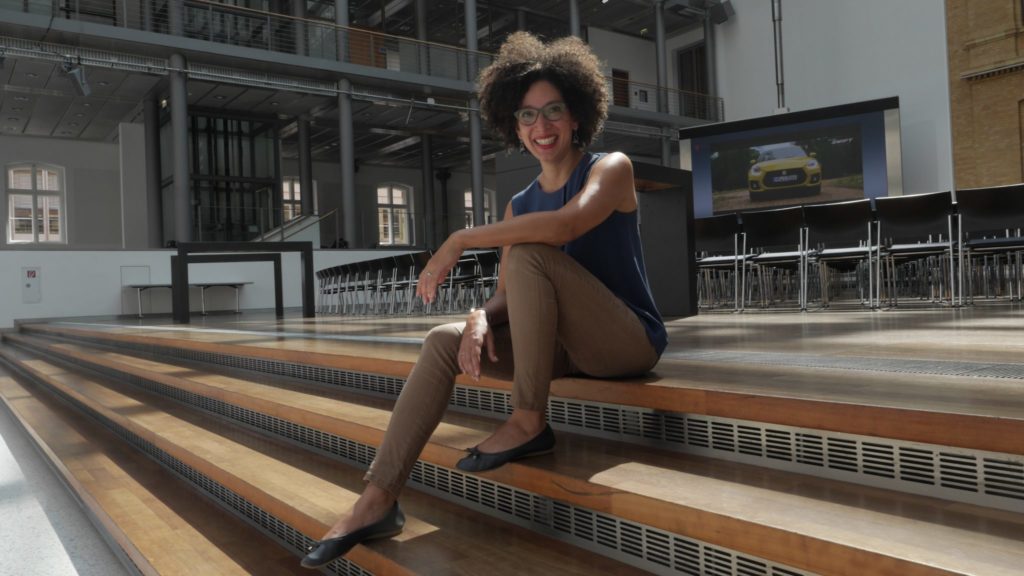
Apart from her main job, Kenza Ait Abbou Laydini also leads the Deutsche Telekom Women Network in Germany and is an ambassador for Deutsche Telekom in the Women in Technology organization. She is also in demand worldwide as a speaker, juror and moderator. She is fluent in seven languages and has won several awards. In 2020, “Capital” magazine selected her as one of Germany’s “young elite” (the top 40 under 40).

